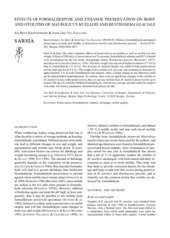Effects of formaldehyde and ethanol preservation on body and otoliths of Maurolicus muelleri and Benthosema glaciale
Peer reviewed, Journal article
Permanent lenke
http://hdl.handle.net/1956/3877Utgivelsesdato
1998Metadata
Vis full innførselSamlinger
Sammendrag
First of its kind, this study examines effects of preservatives on otoliths as well as on fish size and weight. Effects of 200 days of preservation in 4 % seawater formaldehyde solution and 80 % ethanol were investigated for the two small, mesopelagic fishes, Benthosema glaciale (REINHARDT, 1837), and Maurolicus muelleri (GMELIN, 1789). The body weight loss was much higher in ethanol (37-39 %) than in formaldehyde (13-16 %). The decrease in standard length was small in both preservatives and for both species (0.8-3 %). The weight of the otoliths of B. glaciale was estimated to decrease by approximately 3 % in both formaldehyde and ethanol, while a radius change in one direction could not be demonstrated unambiguously. In contrast, there were no significant changes in the otoliths of M. muelleri in any of the preservatives, thus we can use otoliths from M. muelleri preserved for up to at least 200 days in correctly buffered formaldehyde. Growth rate and age can then easily be coupled with other life history parameters obtained from preserved fish.
